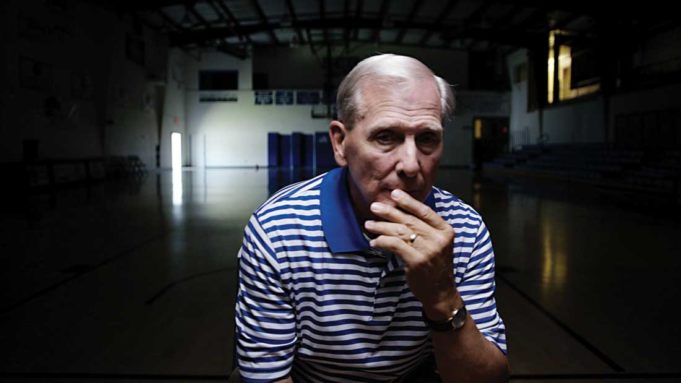Last week, a documentary about scandal at Baylor University premiered on the Showtime network that has nothing to do with football or sexual assault charges.
Instead, Pat Kondelis’ Disgraced zeroes in on the 2003 Baylor basketball fiasco, examining NCAA violations, player threats, and a murder. Released to coincide with the Final Four and NCAA National Championship basketball games, the film brings special attention to well-known college basketball coach Dave Bliss, who tendered his resignation at Southwest Christian University four days after national audiences became privy to new information on a closed case.
The stage is set with the arrival of coach Bliss, who took over a Baylor men’s basketball program that was practically invisible in the competitive Big 12 Conference. Bliss is described as a coach who will do anything to win and a marketing genius by colleagues and former players. Case in point: Patrick Dennehy. A junior who Bliss lured from the University of New Mexico, he agreed to join the program for an athletic scholarship and a Chevrolet Tahoe, the latter compliments of the coach’s personal bank account.
Introductions and backstories continue with Carlton Dotson, another transfer who becomes fast friends and roommates with Dennehy. Trouble brews when Dennehy and Dotson report to coaches that they are being threatened by a junior college transfer, Harvey Thomas. The two purchase weapons and spend time practicing with their guns in rural areas around Waco. Within days of the alleged threats, Dennehy is reported as missing, and Dotson has returned to his home in Maryland. Days of Dennehy missing turns into weeks, and Waco police investigate what becomes a missing persons case. Waco police go as far as to visit Dotson in his Maryland hometown, and not long after Dennehy’s Tahoe is discovered in nearby Virginia Beach. Events, interviews, and evidence yield a confession and a sentence of 35 years in prison. Dotson’s motives for murdering Dennehy remain muddled, and witness accounts cast doubts on his mental capacity to stand trial. Threats from Thomas were never clarified by police or witness accounts, and Thomas continues to deny making any threats.
The briefly outlined story of Dennehy’s murder is but a clothesline of events drying out the dirty laundry of Bliss, Baylor, and unanswered questions about the handling of the case. Coach Bliss flashes his charisma as the ol’ ball coach, seemingly calm and composed throughout his interviews. There are times when Kondelis and his crew try to clarify the coach’s statements, and Bliss backtracks to retrieve credibility. Late in the film, Bliss is shown trying to promote his own book about the misconduct to a group eager to learn about redemption from a difficult situation. Kondelis insinuates that Bliss’ involvement was intended to sell more paperbacks.
Of the many protagonists in this murder story, Coach Abar Rouse, the Baylor alum who was made head of basketball operations weeks before Dennehy’s disappearance, soon realized he would be expected to corroborate Bliss’ lies. As the touchstone of moral imperative in this case, Rouse wires himself with a tape recorder to capture Bliss rehearsing players on how they would denigrate the dead Dennehy as a repugnant team drug dealer. Rouse becomes a martyr for the truth when his recordings expose egregious NCAA violations on the part of Bliss, who then blackballs Rouse for his de facto betrayal of an extremely insular coaching community.
Disgraced has the familiar feel of many documentaries tackling cold cases and murder. Beautiful rural images of Waco and “The Baptist Harvard” please the eyes in a somber and foreboding setting of scene. This documentary does not break convention or reinvent the genre, staying consistently true to murder narratives that have been expressed in other TV documentaries like Making a Murderer. Story and timeline can become muddled when the characters are new to the viewer, but Kondelis does an admirable job of bringing in graphic visualizations. The 105 minutes does drag occasionally, due in part to the grim overture that plays softly throughout most of the film. The only notable change in soundtrack comes with the arrival of a Waco sheriff’s quote to Dotson during his early denial of the murder, a sickly satisfying duo by George Jones and Tammy Wynette: “God’s gonna get’cha for that.”
The audience is left with lingering questions about why Baylor athletics desired to sell a man up the river for a speedy case – Kondelis began filming almost two years before the current sexual assault scandal at Baylor began topping headlines. The most poignant quote from Disgraced is delivered as a closing to the film from Dotson’s attorney in Maryland, Grady Irvin: “Carlton Dotson wasn’t your cancer. He is a byproduct of your cancer. If Baylor University doesn’t, at some point in time, respond to requests for interviews and answer questions forthrightly concerning what was going on with that program, the cancer’s always going to be there. If you don’t get it all, it will come back.”












